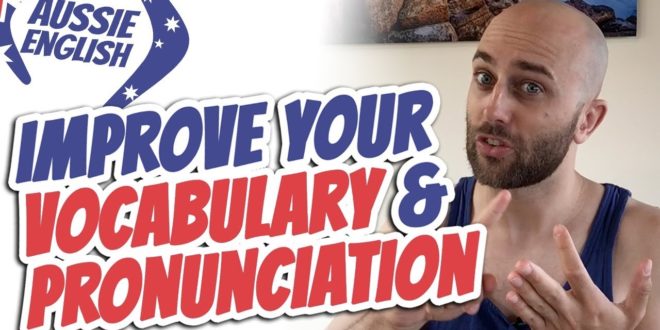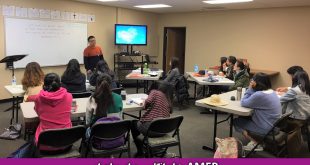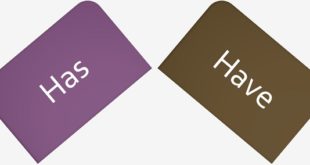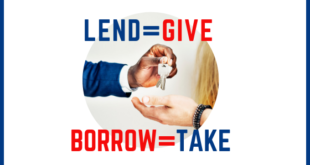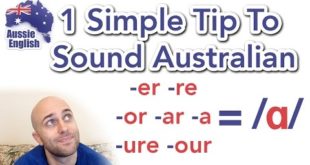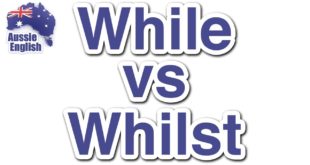What’s going on guys? Happy New Year! (It’s the) first video of the New Year. I have a question here from Haze Moznur Rahman. I hope I said that right. (I) probably didn’t. In fact, I’m certain I didn’t. Anyway, Haze, you had this question. Okay, so he asks, “I’m weak in English vocab and pronunciation. What can I do.
So, I’m going to try and make it a New Year’s resolution of my own to try and answer more of your questions and create videos like this for you guys. But Hazes okay, poor vocab and pronunciation. We’ll tackle vocab first.
So, vocab wise, my advice is always, once you’re at the intermediate to advanced language-learning stage, whether it’s English or any other language, you need to find resources that you enjoy. You also need to make sure that these resources are at your level or above. Preferably above, but not too far that they’re unenjoyable. Okay? So, you need to find resources that you enjoy.
They can be TV shows, they can be movies, documentaries, they can be podcasts, they can be TV shows, TV shows I said, magazines, books, anything that is… that has English, that is made of English, that is written in English, spoken in English, whatever it is, you need to find something you enjoy. You need to find something you enjoy so that it’s easy to watch and it’s easy to watch, or consume, read, whatever it is, listen to, multiple times. Okay? So, the key there is find something you enjoy so that you can, two, consume it multiple times, and then three make sure, especially if it’s a podcast, something you’re listening to, if it’s a a movie or a TV show or something you’re watching, that there are either subtitles below or that there’s a transcript that you can read.
So, this is important because you want to be able to see all the words that may have gone over your head whilst you were just listening. This happens to all of us. It even happens to me sometimes with natives if that they speak too quickly. Maybe my concentration lapses for a moment. But you want it down below or you want it on a transcript also so that you can then take note of any of the words that you have never seen before; that you have seen before, but just can’t remember what they mean; that you have seen before, you have a vague idea of what they mean, but you want to clarify what they mean. And you want to take these down on a notepad. Okay? So, I normally suggest small notepad that you can fit in your pocket so that you can do this anywhere, any time. But I’d be doing that.
I would then go and look these words up, find the definitions. But most importantly find examples sentences. After that, I would write these examples sentences out and I would speak the example sentences out loud as well. Beyond that, I would find examples where I can use them. Maybe I’ll write something, just you know a bit of abstract writing about whatever you want, your day, and try and work the new vocab in them. Try and have a conversation with someone, even if you’ve got the notepad here, and try to use the words that you’ve practicing. The point there is that you need to be actively using the new vocab for it to be maintained in your active vocabulary. Otherwise, it’s going to be passive, and you’re just going to recognise it when you see it or hear it. Okay? So, that’s what I would suggest with learning vocab.
There are really good apps out there like Anki. I’ve mentioned that a few times. And I think Fluent Forever now has a new app that might be able to help you, but it might be a little for beginners, it might be a little not advanced enough for you guys.
Anyway. That’s what I would suggest vocab wise.
Find something you enjoy. Take note of the vocab that you don’t understand; recognise but don’t really remember; or have never seen before. Look it up, write down examples sentences, and then practice speaking that aloud, or in conversation, or with writing. But you need to practice it, especially, if you want to be using this effortlessly like a native speaker. Okay? So, that’s vocab, and it transitions into pronunciation.
Pronunciation wise, you need to either recognise yourself the parts of the pronunciation you’re having trouble with, or you need to get a private lesson with someone, it could be me could be anyone or just talk to a friend, someone who speaks English as a native, and ask them to pick up on the words that you’re mispronouncing. You need to take note of these words, or at least the aspects of these words that you’re having trouble pronouncing, and then you need to look these words up or words with this aspect up. You need to be able to hear these words if possible. So, you could have a teacher like me, or you could have a friend, record themselves pronouncing these words, or you can use websites like Forvo.com to find native speakers who said these words in English. And you can click on them and listen so that you get it right.
The key thing there though is that you want to try to identify the parts of the language you’re finding difficult to pronounce, and then practice pronouncing them, again and again. You might have to do this five minutes a day for a month, maybe a year. It’s an ongoing process. But you need to do this again and again and again if you really want to nail the pronunciation of these tricky words. So, I guess that’s it for today.
I hope it helps, mate. Keep at it. I’m sure you’re going to level up your vocab, and just keep pronouncing words, keep looking for these words that you want to pronounce. Keep speaking out loud. Talk in your room by yourself. Talk with friends. But just keep using English, and she’ll be apples, mate. She’ll keep improving.
So, I hope that helps Haze, and I hope you guys have a great day. See ya.
 ایرانیان استرالیا Australia Iran بزرگترین جامعه ایرانیان ساکن استرالیا Australia Iran
ایرانیان استرالیا Australia Iran بزرگترین جامعه ایرانیان ساکن استرالیا Australia Iran

